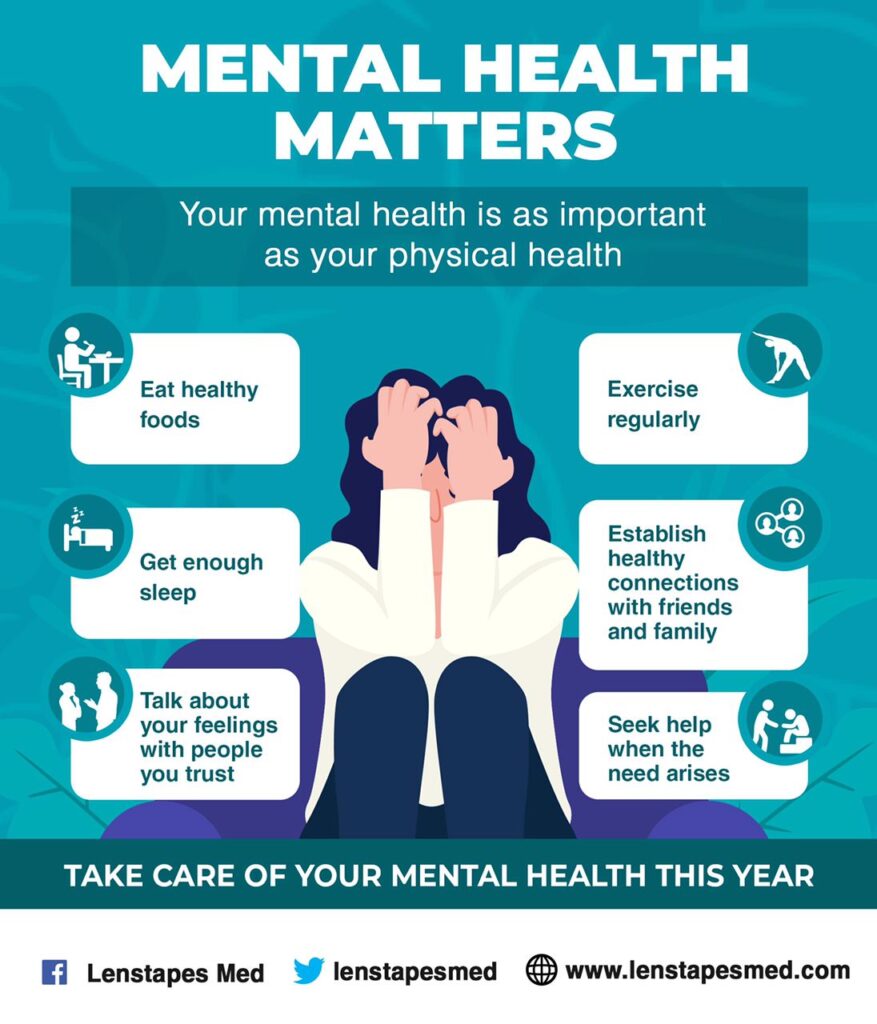Introduction
Mental health is the general psychological well-being of an individual. It includes our emotional, social, and psychological functioning and it affects how we think, feel, and act. Also, it influences how we respond to stress, interact with others, and make good decisions. Maintaining good mental health can prevent or reduce the severity of mental health conditions such as anxiety, and depression.
Below are some ways for maintaining optimum mental health.
1. Eat healthy foods
A balanced diet can help with mental health by giving the body the nutrition it requires to function properly. Certain nutrients, including omega-3 fatty acids and vitamins B and D, may benefit mental health, according to some research.
Your diet should contain a variety of fruits, vegetables, whole grains, and lean proteins. Reduce the amount of processed and sugary meals you eat, take in a lot of water, and avoid skipping meals, particularly breakfast. In order to receive individualised nutrition advice, consider speaking with a certified dietitian.
2. Exercise regularly
Exercise on a regular basis has been demonstrated to increase mood, reduce stress and anxiety, and boost self-esteem. Additionally, it helps improve sleep quality and energy levels. Additionally, it helps enhance the quality of sleep and energy levels.
Find an activity you enjoy, like cycling, swimming, walking, or jogging. Establish a goal, such as aiming to work out every week for a certain amount of hours or days. Establish a strategy like finding a workout partner or scheduling your activity at the same time every day. Begin slowly and build up the duration and intensity of your workouts.
To get direction and inspiration, think about speaking with a personal trainer or fitness professional.
3. Get enough sleep
Getting enough sleep can help manage the symptoms of pre-existing illnesses and lower the risk of developing mental health conditions.
Create a regular sleeping pattern by going to bed and waking up at the same time each day. Establish a calming bedtime routine that includes activities like reading or taking a warm bath. Ensure that your sleeping environment is relaxing, with a comfortable bed and pillows, a dark, quiet room, and an appropriate temperature. Avoid watching screens (such as phones, TVs, and computers) at least an hour before bedtime since the blue light they emit can interfere with sleep. Avoid consuming alcohol and caffeine prior to bedtime.
4. Establish healthy connections with family and friends
Social support can enhance feelings of self-worth, foster a sense of belonging, and aid in stress management.
Schedule time to spend with those who matter to you, whether it is through frequent phone or video chats, in-person visits, or both.
Talk to your loved ones honestly and openly, and pay attention to what they have to say.
5. Talk about your feelings with people you trust
Sharing your emotions with a trusted friend or family member can improve your relationships and make you feel less isolated.
Find a friend, family member, therapist, or someone else with whom you feel comfortable talking. Pick a time and location where you and the person you’re speaking with feel safe and private. Think about keeping a diary to record your ideas and emotions.
6. Seek professional help when the need arises
It could be time to get professional assistance if you’ve tried self-care techniques like eating healthily, exercising, and talking to loved ones but are still having problems with your mental health. Feeling overburdened, having trouble functioning, noticing a big shift in your attitude or behaviour, or having thoughts of harming yourself are a few indications that you might need further support.
Consider joining a support group or online community if you’re having problems finding someone to talk to.
Conclusion
In conclusion, mental health is important in the same way that physical health is. It is essential to take care of our mental health and get assistance when required. Destigmatizing mental health problems and fostering an environment in which people may ask for assistance without being judged are equally important. We can improve our general quality of life and live happier, healthier lives by giving our mental health the attention it deserves.
Watch video
Connect with the author on LinkedIn: Isaac Debra Agyapong











